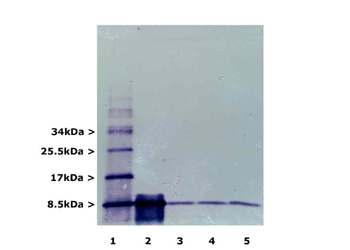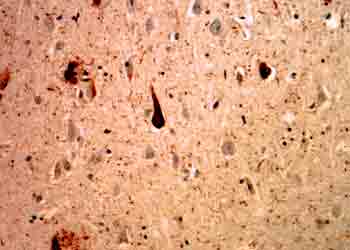

Catalogue# MCA-Ubi-1-AP: Affinity Purified Ubiquitin Monoclonal Antibody Ubi-1
The Immunogen: Ubiquitin is a highly conserved globular 76 amino acid protein of about 8.5 kDa molecular weight. It has a important role in the targeting of proteins for proteolytic degradation. Proteins to be degraded are covalantly coupled to the C-terminus of ubiquitin by means of ubiquitin ligases. The ubiquitin itself is frequently also ubiquitinated, producing a polyubiquitin chain. The polyubquitinated complex is then recognized by a complex of degradative enzymes which together form the proteosome. Interestingly, ubiquitin also becomes covalently bonded to many types of pathological inclusions seen in serious human disease states which appear to be resistant to normal degradation, so that ubiquitin antibodies are very useful for studies of these inclusions. For example the neurofibrillary tangles and paired helical filaments diagnostic of Alzheimer's disease, the Lewy bodies seen in Parkinson's disease, and Pick bodies found in Pick's disease are all heavily ubiquitinated and can all be readily visualized with ubiquitin antibodies of appropriate specificity.
We are OEM suppliers of this antibody- in other words we manufactured it, characterized it and generated the data presented on this page. This antibody is available from several other vendors, but we can supply it more cheaply and we can provide you with more detailed information on the properties of the antibody.


Left: Immunoblotting of MCA-Ubi-1 on (lane 1) poly-ubiquitin (lys63 linked), (lane 2) pure ubiquitin and lanes 3-5 crude homogenates of adult rat cortex, cerebellum and brain stem. Click on images for higher magnification view. Right: MCA-Ubi-1 staining of cerebral cortex of an Alzheimer patient. Neurofibrillary tangles and dystrophic neurites associated with senile plaques stain strongly with this antibody. In the center is a typical neurofibrillary tangle containing neuron.
Antibody characteristics: MCA-Ubi-1 was made in the University of Florida in 1987, and has been continuously on the market place since 1989, and is now being sold by several vendors. It has become widely used to study ubiquitinated inclusions seen in Alzheimer's and other kinds of disease. MCA-Ubi-1 was raised against purified ubiquitin conjugated with glutaraldehyde to keyhole limpet hemocyanin. The clone was initially screened on ELISA of the immunogen, and subsequently tested on sections of Alzheimer brain. MCA-Ubi-1 was one of several clones which stained neurofibrillary tangles in frozen sectioned material strongly and specifically. Subsequent studies indicated that MCA-Ubi-1 is relatively insensitive to formalin fixation and so can be used on mildly fixed histological sections of human brain for studies of Alzheimer's disease. The antibody also works on paraffin embedded material. MCA-Ubi-1 also recognizes other ubiquitinated inclusion bodies such as the Lewy bodies of Parkinson's disease and the Pick bodies in Pick's disease in formalin fixed tissues. MCA-Ubi-1 will recognize human, bovine, chicken, Drosophila, and C. elegans in ELISA. MCA-Ubi-1 also works on Western blots and can be used to study ubiquitinated proteins. It has also been successfully used in competitive ELISA. MCA-Ubi-1 is a mouse IgG1 with a k light chain. We supply the antibody in purified form at a concentration of 1mg/ml. Purification is accomplished using a Protein A affinity column, and the purified antibody is in a phosphate buffered saline solution. We added 10mM sodium azide preservative (Press here for Material Safety Data Sheet, or here to download a PDF of this information). Avoid repeated freezing and thawing. Aliquots may be kept at 4°C for short term or -20°C or -80°C for long term storage.
Suggestions for use: MCA-Ubi-1 is excellent for the detection of ubiquitinated inclusions seen in human neurodegenerative diseases such as the neurofibrillary tangles of Alzheimer's disease. We recommend a starting dilution of 1:1,000 for this purposes, using ABC or other enzymatic amplification procedures. For immunofluorescence try a dilution of 1:500.
OMIM Link: press here
Limitations:
This product is for research use only and is not approved for use in humans
or in clinical diagnosis.
Older References:
Perry, G. et al. Proc. Natl. Acad. Sci. USA 84, 3033-3036 (1987)
Shaw, G. and Chau, V. Proc. Natl. Acad. Sci. USA 85, 2854-2858 (1988)
Hirano, S., et al. Cell 70: 293-301 (1992)
Cuervo, A.M., et al. Mol. Biol. 9: 1995-2010 (1995)
Sternsdorf, T.,
et al. J. Cell Biol. 139: 1621-1634 (1997)
Tae-Wan Kim, et al. J. Biol. Chem. 272: 11006-11010 (1997)
Verdier, F., et al. J. Cell Biol. 273: 28185-28190 (1998)
Laroia, G., et al. Science 284: 499-502 (1999)
Marti, A., et al. Nature Cell Biol. 1: 14-19 (1999)
Sternsdorf, T., et al. Mol. Cell Biol. 19: 5170-5178 (1999)
Recent Papers using MCA-Ubi-1:
Fortun J, Go JC, Li J, Amici SA, Dunn WA Jr, Notterpek L. Alterations in degradative pathways and protein aggregation in a neuropathy model based on PMP22 overexpression. Neurobiol Dis. 22:153-164 2006
Boutajangout A, Authelet M, Blanchard V, Touchet N, Tremp G, Pradier L, Brion JP. Characterisation of cytoskeletal abnormalities in mice transgenic for wild-type human tau and familial Alzheimer's disease mutants of APP and presenilin-1. Neurobiol Dis. 15:47-60 (2004).
Wang DS, Bennett DA, Mufson EJ, Mattila P, Cochran E, Dickson DW. Contribution of changes in ubiquitin and myelin basic protein to age-related cognitive decline. Neurosci. Res. 48:93-100 (2004).
He CZ, Hays AP. Expression of peripherin in ubiquinated inclusions of amyotrophic lateral sclerosis. J. Neurol. Sci. 217:47-54 (2004).
Ungureanu D, Saharinen P, Junttila I, Hilton DJ, Silvennoinen O. Regulation of Jak2 through the ubiquitin-proteasome pathway involves phosphorylation of Jak2 on Y1007 and interaction with SOCS-1. Mol Cell Biol. 22:3316-26 (2002)
Wirbelauer C, Sutterluty H, Blondel M, Gstaiger M, Peter M, Reymond F, Krek W. The F-box protein Skp2 is a ubiquitylation target of a Cul1-based core ubiquitin ligase complex: evidence for a role of Cul1 in the suppression of Skp2 expression in quiescent fibroblasts. EMBO J. 19:5362-75 (2000).
Harris KF, Shoji I, Cooper EM, Kumar S, Oda H, Howley PM. Ubiquitin-mediated degradation of active Src tyrosine kinase. Proc Natl Acad Sci U S A. 96:13738-43 (1999).
Sternsdorf T, Puccetti E, Jensen K, Hoelzer D, Will H, Ottmann OG, Ruthardt M. PIC-1/SUMO-1-modified PML-retinoic acid receptor alpha mediates arsenic trioxide-induced apoptosis in acute promyelocytic leukemia. Mol Cell Biol. 19:5170-8 (1999).
Marti A, Wirbelauer C, Scheffner M, Krek W. Interaction between ubiquitin-protein
ligase SCFSKP2 and E2F-1 underlies the regulation of E2F-1 degradation.
Nat
Cell Biol. 1:14-9 (1999).
Availability and Price:
Available for shipping now, $200 US per aliquot of 100 microliters of protein A purified antibody at a concentration of 1mg/ml, enough for hundreds of experiments. The exact same antibody can be obtained from several other suppliers, all of who charge more than EnCor. For order form press hereUse of Images or Text: The contents of this page are available for modification and reuse under the terms of the Creative Commons Attribution/Share-Alike License 3.0 and the GNU Free Documentation License, unversioned with no invariant sections, front-cover texts, or back-cover texts. These licences permit modification and reuse, even commercially, as long as authorship credit and a link to this page is given.